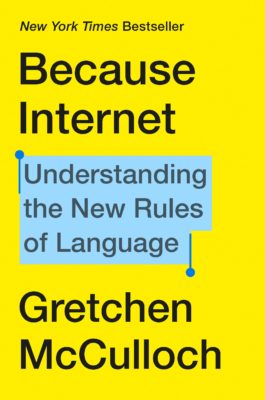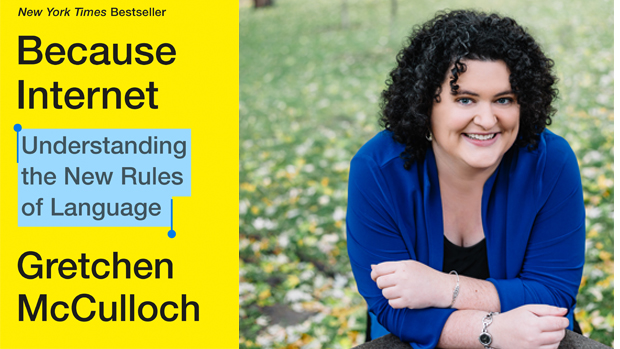Among people interested in language, there’s a schism: prescriptivists (those who strictly follow the existing rules and think everyone else should, too) and descriptivists (who have an appreciation for language as it’s used in the real world, in all its messy, rules-flouting glory). Montreal writer Gretchen McCulloch is a hardcore descriptivist. Her book, Because Internet: Understanding the New Rules of Language, is a study of what she calls “informal writing” and how it’s flourished in the online era. No scolding here about the kids these days and their incomprehensible forms of communication; McCulloch delights in all the twists and turns the English language has taken, while gleefully shooting holes through prescriptivist dogma along the way.
As a former prescriptivist who has loosened up through the years, I was nonetheless occasionally horrified by just how informal McCulloch’s writing gets (I guess I’m too old-fashioned not to experience cognitive dissonance at the use of the word “sexxaayy” in an intellectual context). Conversely, she sometimes goes deep into the linguistic lingo, leaving a non-expert scrambling to keep up. But in general, her enthusiasm for the topic is infectious; her heavily researched collection of information, fascinating; and her arguments, ultimately convincing. (Basically, formal writing is safe, and when it comes to informal writing, the prescriptivists have hopelessly lost the battle and just need to lighten up.)

Because Internet
Understanding the New Rules of Language
Gretchen McCulloch
Riverhead Books
$26.00
cloth
336pp
9780735210936
An entire chapter is devoted to emojis, while another, “Typographical Tone of Voice,” explores the history (well preceding the internet) of trying to communicate tone in writing. I never knew about the multiple approaches throughout history to indicate sarcasm in text, from backwards italics to several failed attempts to create ironic punctuation marks, but I’m sure glad I do now (and I’m not being sarcastic).
McCulloch, a self-described “pop linguist” who writes a linguistics column for Wired and co-hosts the podcast Lingthusiasm, grew up in Nova Scotia and has been based in Montreal since 2011. (She speaks French and was able to rattle off a few examples of online French language, but doesn’t consider herself an expert – “I’d have to know more teenagers,” she explains.) I spoke to the highly articulate and animated writer a few days after her book, to her surprise and delight, hit the New York Times Best Seller list.
Malcolm Fraser: The title seems kind of cheeky or provocative. Was that your intention?
Gretchen McCulloch: The “because x” construction is part of a kind of stylized verbal incoherence that people use online. I unpack a lot of assumptions in the book about what it is exactly that’s causing language to change, and it’s not all with the internet, but people’s first assumption is that it’s obvious – clearly everything is happening “because internet.” So I wanted to play with and play against that assumption.
MF: I’m not sure how much of this comes with the territory of being a linguist and how much is just you personally, but you seem firmly on the descriptivist side. Are there any expressions that bug you or make you feel old?
GM: When you talk to practicing linguists who have this interest in analyzing language, they’re a very descriptivist camp. It’s the sort of self-appointed grammar guardians that have this “sky is falling” approach. Actual linguists are very positive about language change. Of course language changes, of course language evolves, and our attitudes towards a particular way of speaking say more about our attitudes towards the people associated with that way of speaking than anything about the language itself.
MF: So that’s a no, then?
GM: That’s a no. My life has been so much better when you take this sort of relaxed, curious, interested attitude towards how language changes. It doesn’t mean that I have to personally use every single form of language. If something is associated with the kids, I don’t need to go around trying to pretend that I’m younger than I am. But it doesn’t mean that they’re doing something wrong just because it feels a bit too young for me.
MF: You use internet language a lot in the book, not just in your examples but in your own writing voice. Was there anything you argued over with your editor?
GM: I think it’s weird for a book about the internet to not embrace the form. So a lot of things I was very up front about – I said “this is a thing I’m just going to do.” One of the things I was very clear about early on was that I was going to lowercase “internet” the entire way through. As it happened, when I started writing the book, the AP style had not yet endorsed lowercase “internet,” and midway through me working on it, they switched. So that kind of gave me ammunition to say, “Well, anything else that I’m doing that’s a bit future-leaning is also potentially going to be embraced by style guides in the next five to ten years” [laughs].
MF: What kind of feedback have you got on the book so far?
GM: It’s been very gratifying to see people say, “This book converted me from being more curmudgeonly in response to internet language.” You get a lot of people saying, “But isn’t the internet ruining the way we communicate?” or something like this, and I do get this question a lot, but people seem open to being persuaded otherwise.
MF: Why are people bothered by informal writing or language?
GM: I think it’s easy to project our anxieties or worries or attitudes about different groups of people onto the form of the language that they use. But it is a projection.
MF: In some of the interviews I’ve read with you, there’s a kind of urgency to the questions people ask. This seems important. Why is it?
GM: That’s a big question [laughs]. People are very interested in language. But I think that people’s attitude is shifting from “I like language, and therefore I have to be uptight about it” to “I like language, and therefore I can be open and hospitable about it.” That’s something I hear from a lot of people who are recovering prescriptivists and have realized that they don’t have to live life that way, and that it’s more fun to approach language from this attitude of curiosity and potentially being exposed to more of language’s infinite variety. Maybe that makes us more open to thinking about the bigger things that language can express, and how can you do language in a way that’s creative and hospitable and friendly, and that makes space for a larger group of people, rather than a narrow view of commandments passed down from on high. mRb







0 Comments